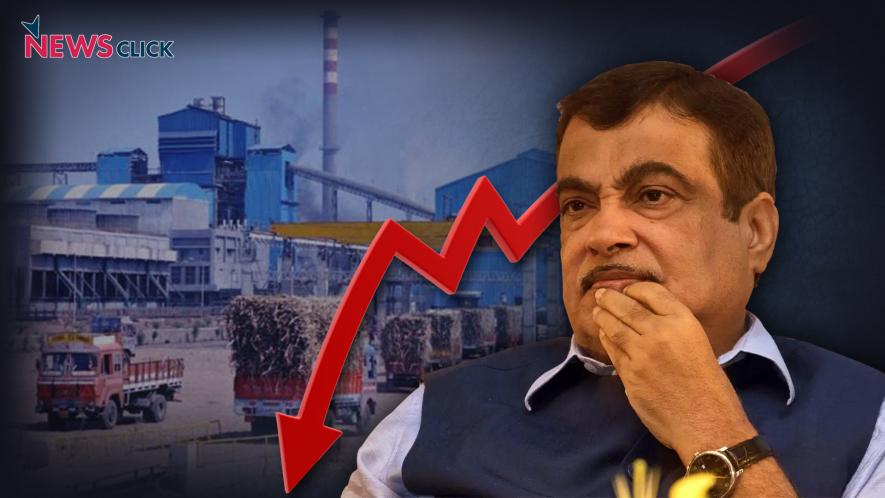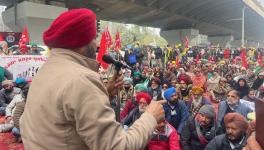Chowkidar Hi Chor Hai: Part 1 – A “Sweet” Deal for Nitin Gadkari

As of March 2019, the total non-performing assets (NPAs) held by public sector banks stand at Rs. 8.96 lakh crore, up from just over Rs 2 lakh crore in 2014. Of this total, over 82% are estimated to be due to corporate defaulters. A mere 40 corporate groups account for a third of the total corporate NPAs.
The government and the Reserve Bank of India (RBI) have huffed and puffed on this issue, implementing the Insolvency and Bankruptcy code and forcing banks to “clean up their balance sheets” via pushing NPA accounts into insolvency proceedings. However, the problem has only magnified, with very little of the money being recovered. Between 2014 and 2018, the country’s 21 public sector banks ended up writing off Rs 3.16 lakh crore of these bad loans, recovering only Rs 44,900 crore.
An appeal to political parties issued in January 2019 by bankers’ unions, people’s movements, civil society organisations and concerned citizens on finance and banking identified the piling up of NPAs as the “central problem of the Indian banking industry”. Four thousand six hundred and ninety-three cases of fraud worth over Rs. 1 lakh were reported in 2015-16. That number rose to 5,904 in 2016-17. The appeal blamed “political interference in the functioning of public sector banks” for having “promoted crony capitalism and corruption”.
Based on documents received from a source in the banking industry, in this three-part series, we shall take a close look at three such instances of political interference in a public sector bank that are exemplary of the conduct that has caused the crisis.
The upcoming second and third parts will respectively look at a Gujarat-based company with links to the prime minister and a Maharashtra-based company linked to a Bharatiya Janata Party (BJP) minister in the Maharashtra government.
In this exclusive first part, NewsClick can reveal the case of a company linked to Nitin Gadkari, the current Union Minister for Road Transport and Highways, Shipping, and Water Resources, River Development, and Ganga Rejuvenation in the Government of India. A company linked to Gadkari allegedly received loans from a public sector bank in violation of the bank’s own policies and past decisions, and has received multiple subsequent loans to prevent the account from turning into an NPA – a phenomenon called “evergreening.” Read on.
The Purti group of companies, founded by Nitin Gadkari, is no stranger to a controversy. In revelations made by former Aam Aadmi Party member and anti-corruption activist Anjali Damania in 2012, its ownership structure had become the subject of an enquiry by the Income Tax authorities. It had emerged that several shell companies were heavily invested in the group, and allegations of a nexus involving the businessman Dattatray Pandurang Mhaiskar of Ideal Road Builders (IRB) – a major infrastructure developer – that came to envelope even opposition leaders such as the Nationalist Congress Party’s Sharad Pawar had then cost Gadkari a potential second term as the Bharatiya Janata Party’s national president.
One of the key details of the revelations made at the time was a low-interest loan of Rs 164 crore that a Mhaiskar-owned company – Global Safety Vision – had given to a Purti group company named Purti Power and Sugar Limited in March 2010. When this fact was revealed in 2012, Mhaiskar had told the Times of India that he had made the loan out of his “personal savings” to help the Purti group “tide over a financial crisis”. At the time, the revelation had attracted scrutiny due to the fact that companies in the IRB group had bagged a number of major infrastructure contracts during Gadkari’s tenure as Maharashtra’s public works minister during the BJP-Shiv Sena government that ruled the state in 1996-99, and thus accusations of a “quid-pro-quo” had done the rounds.
We reveal two issues in this article. First, what was the precise nature of the financial crisis that the Purti group was going through at the time, and how did Global Safety Vision’s loan help? We shall detail this part first, before addressing the second issue.
Purti Sakhar Karkhana Limited
Purti Sakhar Karkhana Limited, incorporated in the year 2000, and now known as Purti Power and Sugar Limited is one of the companies at the heart of the Purti empire. In a public interaction in 2018, Gadkari stated that the group – which he has now dissociated from, and is run by his sons – had clocked a turnover of Rs 1100 crore that year. This is the company that has built an integrated project for the manufacturing of sugar, distillery products, ethanol and co-generation of power (using bagasse, a byproduct of the sugar manufacturing process as fuel) on the outskirts of Nagpur – a “farmer-friendly business” that Gadkari had once admitted had made him “immensely popular” and “given [him] the confidence to contest the Lok Sabha elections from Nagpur”.
Also read: NPAs are Corporate Loot of Public Banks
The initial investment for the construction of the complex had arrived in three parts. The sugar plant had been financed by a consortium of co-operative banks, the power plant by the Indian Renewable Energy Development Association, and the distillery and the ethanol plants by the Bank of Maharashtra (BoM).
The BoM loan for the distillery and ethanol plants, granted in August 2003, was worth Rs 35.62 crore. It had been given out by the bank’s industrial finance branch in Mumbai. At the time, Gadkari was at the company’s helm.
This loan was classified as an NPA by the BoM in July 2004, within less than a year of its sanction. Internal notes of the BoM in NewsClick’s possession explain why this happened. The distillery and ethanol plants, construction of which had been completed by April 2004, were lying idle. The company had submitted bids in May 2004 to tenders issued by oil companies, but hadn’t won any supply orders. There was another round of oil company tenders due soon, and the company expected to start production by March 2005.
The bank conducted a site visit to the facility in Nagpur, and was satisfied with the progress of the project, despite its failure to begin repayments on time. It had also kept track of progress reports issued by a third party consultant. Based on its own site visit, and the third party consultants observations, the BoM management had agreed to a later date of repayment of the loan than had been specified in its original terms (failure to adhere to which had earned the loan the NPA tag). The bank also financed the interest payments that the company was missing, in the form of another short-term loan. This was in February 2005.
The bank steadily “provided” for the NPA (in banking “provisions” are, in simple terms, money that the bank sets aside in separate accounts for loans which are classified as NPAs, to take them off their profit and loss account) as the delays mounted. In January 2006, the bank granted another request to finance the accounts’ interest costs and agreed to once again reschedule the date of commencement of repayment. Such deferrals continued till 2009.
It was finally in September 2009, when the bank had fully provided for the NPA, that it considered recovering as much of the amount as it could. In doing so, the bank would do what is known as a “technical write-off” – the NPA would be written off from the banks’ accounts, after it arrived at a compromise amount that it would recover from the account holder.
Also read: Public Sector Banks Reeling Under NPAs Post Huge Losses
This compromise amount went through three iterations. On September 14, 2009, an internal letter stated that the bank’s management had sanctioned an offer of a one-time settlement of Rs 23 crore. By September 31, the offer had risen to Rs 28 crore. Two days later, on October 1, the offer had changed to Rs 25 crore. The bank would be taking a loss of Rs 10.62 crore. This was the amount that was finally paid.
The banking source confirmed to this author that this payment was made not by Purti Sakhar Karkhana Limited, but by another company – Global Safety Vision. Dattatray Mhaiskar was described as this company’s “key person.” This clears up the question of at least a part the “financial crisis” that Mhaiskar was helping tide over through the controversial loan of Rs. 164 crore. It must be noted that the company was going through several similar one-time settlements with its various creditors at the time, and another document in Newsclick’s possession states as much, in plain language: “During 2009-10, the company has obtained secured loan of Rs. 164 crore from M/s Global Safety Vision Private Limited, Mumbai, mainly for the purpose of effecting [one-time settlements] with its secured lenders.”
“No fresh credit facilities?” What about Mahatma Sugar?
One of the terms of the one-time settlement that the BoM had reached with Purti Sakhar Karkhana Limited, was a crucial one, as far as the bank was concerned. Documents in possession of NewsClick detailing the terms of the settlement include the clause “no fresh credit facilities [are to] be sanctioned to the company, directors, guarantors, or to the firms where they are associated”.
However, in September 2011, the BoM did just that, this time through its Karve Nagar branch in Nagpur. On September 21, another company named Mahatma Sugar and Power Limited, was sanctioned various loans by the BoM, totaling Rs. 57.37 crore. It did so as part of a consortium with the Andhra Bank, that was financing the company to set up a co-generation power plant at a sugar manufacturing unit that it had acquired in Wardha.
This company listed Gadkari’s son, Sarang Gadkari, as a director. More crucially, for the loan grant, Nitin Gadkari himself was listed as a guarantor, who’s “personal guarantee” was part of the security for the loan, according to multiple documents in NewsClick’s possession. This was in stark violation of the bank’s own earlier restriction on issuing credit to “the directors, guarantors, or to firms where they are associated” of the individuals linked to Purti Sakhar Karkhana Limited. To clarify, not only was Nitin Gadkari a director of Purti Sakhar, and thus a borrower in that capacity, he had also acted as a guarantor of that loan in his personal capacity, according to the documents.
Interestingly, the same document also lists “associate/sister concerns” of Mahatma Sugar and Power that do not bank with BoM. The only company listed is Purti Power and Sugar. Five companies are listed as Purti’s bankers. Four are cooperative banks. The first on the list, however, as its “banker” is the same Global Safety Vision. The document notes that Mahatma Sugar and Power “informed that there are no common directors between M/s Mahatma Sugar and Power, and M/s Purti Sugar and Power” and “they do not have any sister concern” and thus avoids studying Purti’s balancesheets altogether while granting loans to Mahatma.
Having been granted this Rs 57.37 crore, in 2011, the same loan was reviewed and renewed by the BoM Karve Nagar Branch, Nagpur in July 2014, according to another document in NewsClick’s possession. This came despite the fact that a report by CRISIL (formerly Credit Rating Information Services of India Limited) had downgraded Mahatma Sugar and Power’s credit rating in January 2014, a fact that the bank’s credit approval committee considered in its appraisal of the review and renewal of Mahatma’s loan. According to information revealed by the source – the BoM’s total exposure to Mahatma Sugar and Power has now reached Rs 85 crore, through similar mechanisms as in the case of Purti Sakhar Karkhana – financing of interest costs – to “save it from becoming an NPA”.
Political influences?
In this article, we allege neither any criminality nor any other form of wrongdoing on anyone’s part directly. If investigation agencies, or more likely BoM’s internal processes were to look into the matter of how a loan was granted with Gadkari as the guarantor, despite a previous injunction against doing so, it is possible that some bank officials may face sanction. What is clear, however, if it needs any more underlining, is that this is as evident an instance as any of a politically significant individual’s transactions with a public sector bank having fallen foul of norms.
The NPA crisis may abate over the next few years, whether via write-off or recovery. It will probably get worse before it gets better, as, according to ratings agency India Ratings (domestic arm of Fitch), accounts worth a further Rs. 3.5 lakh crore are yet to be recognised as NPAs. Reportedly, according to the figures provided to the Parliament’s standing committee on finance, the former RBI governor reported that in the year 2017-18, about 55% (Rs. 84,272 crore) of reduction in NPAs was due to write-offs, and only 27% was actually recovered. This may be a paradoxical side effect of the RBI having pushed banks to force NPA account holders into insolvency proceedings via its infamous “February 12 circular” that the Supreme Court recently struck down. However, that will not stem the rot. Without an intervention into the system of political influence over public sector banks, it will merely sow the seed of the next crisis.
Get the latest reports & analysis with people's perspective on Protests, movements & deep analytical videos, discussions of the current affairs in your Telegram app. Subscribe to NewsClick's Telegram channel & get Real-Time updates on stories, as they get published on our website.
























